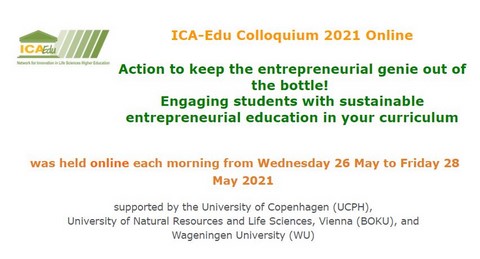INTRINSIC powers second ICA-Edu Colloquium on Sustainable Entrepreneurship 25.05.-26.05.2021
The ICA-Edu Colloquium "Action to keep the entrepreneurial genie out of the bottle! Engaging students with sustainable entrepreneurial education in your curriculum" was held online each morning from Wednesday 26 May to Friday 28 May 2021 and was powered by INTRINSIC. The full program and summary notes can be found HERE.
A Colloquium focus
The new generation of graduates of the agricultural and life sciences are expected to show creativity, resilience, pro-activeness and risk-taking while being able to recognise business opportunities: in short to exhibit entrepreneurship competencies to meet the expectations of their future employers.
Whereas traditionally entrepreneurship education was the domain of business schools to stimulate new venture creation, entrepreneurship education has become more and more a university wide approach in our traditional universities.
The development of an entrepreneurial mind-set and entrepreneurial competence of our students is increasingly dependent on the entrepreneurial experience gained throughout the whole degree programme curriculum.
The goal of this Colloquium is to share views, experiences and practises on how to stimulate the nascent entrepreneurship competencies of our students through both curricular and extra-curricular activities in the agricultural and life sciences.
B Colloquium themes
The Colloquium follows from the discussions at the 2019 Colloquium. We will further explore the challenge of embedding sustainable entrepreneurial education across the curriculum.
The sessions will address the development of students’ entrepreneurial competences in dedicated curricula and other interventions as a basis for the discussion of developing the required competences across discipline focused curricula.
We will also explore models for student innovation hubs which provide the opportunity for students to turn a business idea into commercial reality in what is often an extra-curricular activity. The experience gained in such hubs supports the development of a student’s entrepreneurial competences. In the final session we will discuss the assessment of the entrepreneurial competences acquired.
C The Colloquium Outcomes allowed delegates to reflect on:
1) on the wider application of two approaches to embedding sustainable entrepreneurial learning outcomes in dedicated curricula in
2) the role of student innovation hubs in challenging students to apply and further develop their entrepreneurial competences in bringing their business ideas to reality
3) alternative approaches for assessing the success with which students’ have developed their sustainable entrepreneurial competences
